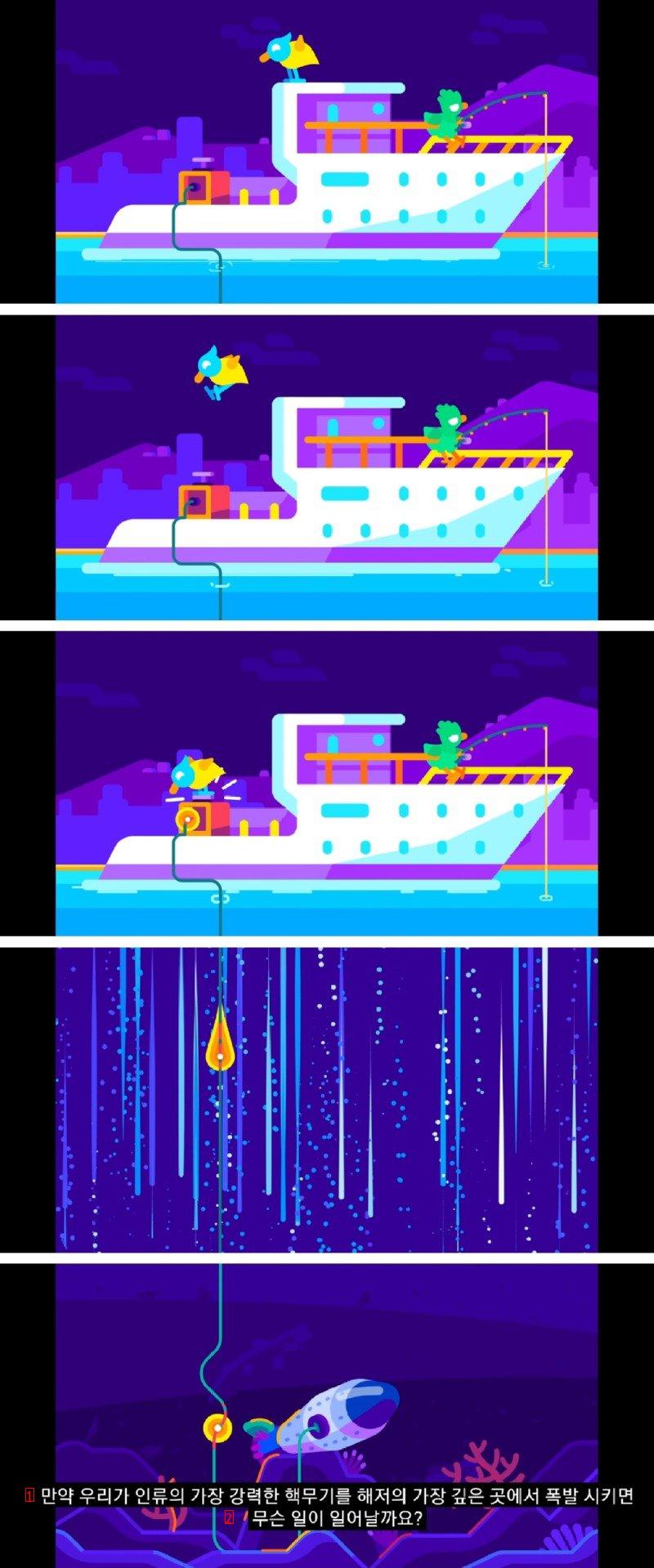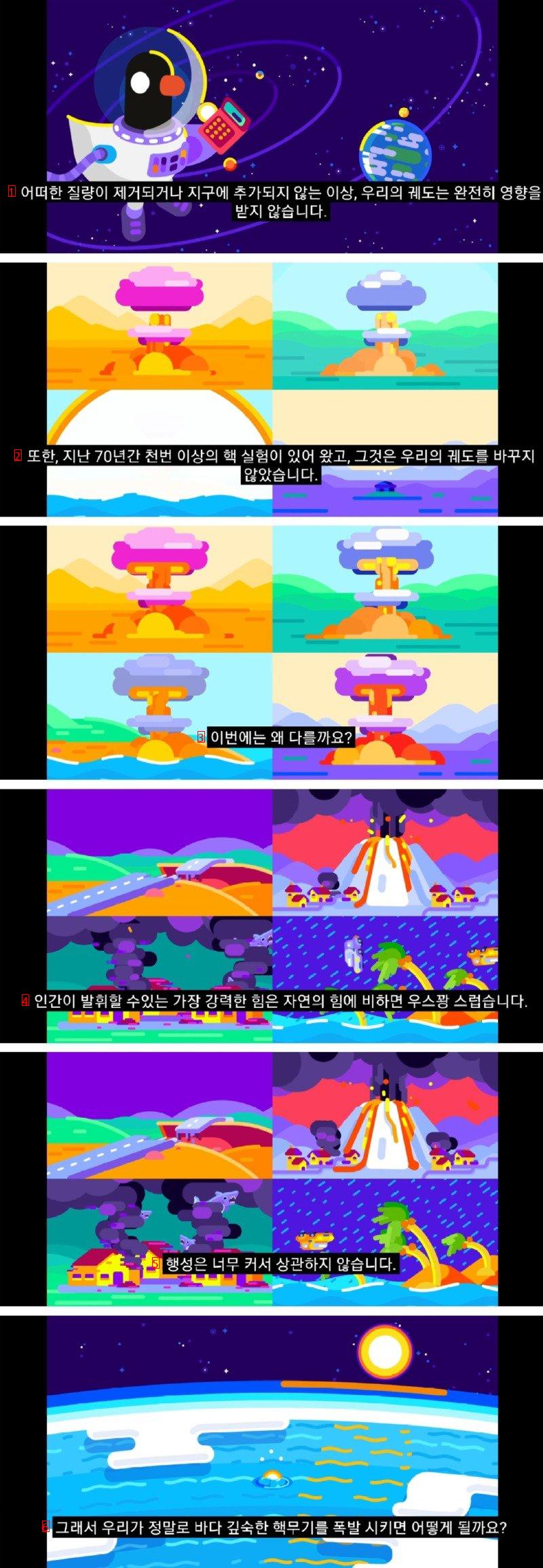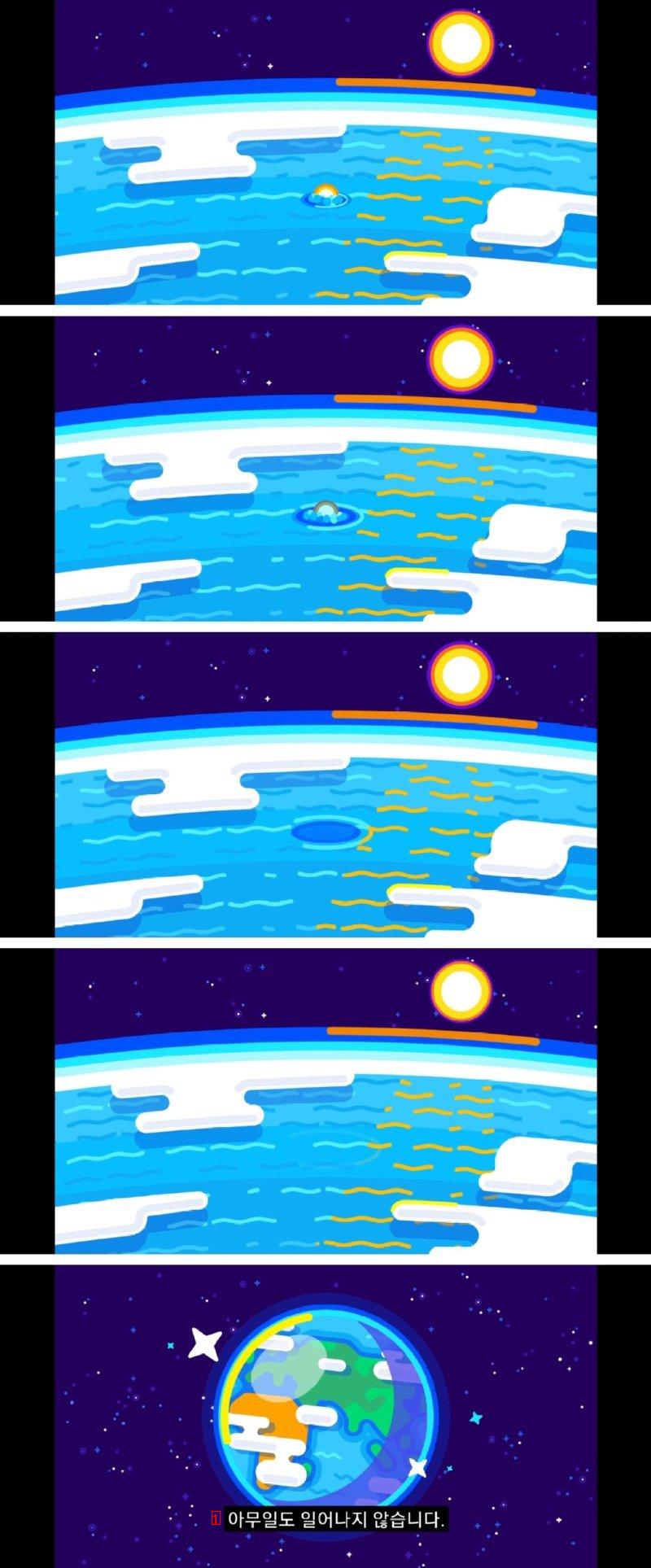
image text translation
(1)If we detonate the most powerful nuclear weapon of mankind in the deepest part of the ocean floor
(2)”What will happen?”
(1)A tsunami hundreds of meters high could destroy a coastal city
image text translation
(2)Earthquakes devastated the country
(3)New volcanoes will bring us nuclear winter
(4)Maybe the earth is shattered
(5)It might bounce off the track
(6)Well, maybe
(1)The deepest known point on Earth right now is
image text translation
(2)This is the Mariana Trench
(3)The Mariana Trench is located on the edge of two tectonic plates, the Philippine plate, and the Pacific plate
(4)into a very deep valley
(5)It looks like an inverted mountain
(6)The Mariana Trench is about 11 kilometers deep
(7)than where the Titanic sank
(8)It’s almost three times deeper
(9)The Mariana Trench is one of the last places that mankind can explore
(10)It’s a relatively quiet environment despite pitch darkness and pressure above 1,000 atmospheric pressure
(11)out of reach of man’s reach
(12)It has a relatively clean environment
(13)Because there are no people It’s the best environment for a nuclear test like this
(1)It’s a great place for our nuclear tests
image text translation
(2)We’re going to detonate the RDS-220 hydrogen bomb, the biggest nuclear explosion in human history
(3)It’s a bomb called a tsarbomba
(4)The explosion was so big that the shock waves traveled around the Earth three times
(5)It’s a bomb that rose up to 56 kilometers
(1)The shock wave is a thousand square kilometers long
image text translation
(2)powerful enough to destroy everything
(3)The crater was hot enough to melt rocks
(4)A bomb that releases such a huge amount of energy at once can evaporate the entire lake
(5)If you drop a nuclear bomb on the Mariana Trench
(6)What will happen
(1)Let’s pull the trigger
image text translation
(2)Nuclear fuel causes a chain reaction in the first few microseconds
(3)TNT explodes with 50 megatons of power ACTION
(4)Brilliant flashes have created a dark trench in Earth’s history
(5)I’m going to make it bright for the first time
(1)The heat of the explosion creates a mixture of water vapor and radioactive nuclear debris
image text translation
(2)The bubbles grow rapidly, evaporating the surrounding water
(3)The pressure of the bubble is so great that it increases tremendously outward as if it doesn’t interfere with anything
(4)It’s generating shock waves that are as big as earthquake stations and whales all over the world can feel
(5)And soon the shock wave stops
(6)On the surface of the earth, this crater foam
(7)It will grow up to 10 kilometers
(8)Because the atmosphere doesn’t have the power to resist pressure
(1)The pressure at the bottom of the Mariana Trench is enormous
image text translation
(2)The fact that 11 kilometers of water is in the Mariana Trench, which is weighed down from above
(3)It’s like a hydraulic press is pressing everywhere
(4)One second after the explosion, the bubble is 01型呈0
(5)And then at a certain moment, it starts to shrink
(6)As the foam increases and the pressure decreases, the water presses down on the foam
(1)Because of the pressure difference between foam and water, it increased and decreased
image text translation
(2)Eventually, the bubble disappears forever
(3)The pressure around it is too high and the turbulence starts to break the bubble
(4)Bubbles are shaped like mushroom clouds made of water
(5)It’s very small, it’s high in temperature, it collapses into a radioactive bubble, and it drifts to the surface
(6)And when our powerful destructive explosion goes up to the surface it basically does nothing
(1)It’s just radioactive warm water, swirling with little waves
image text translation
(2)The tsunami won’t sweep Japan or California But boats and whales in this area may have a bad time
(3)In a few days, the radioactive fallout will dilute to the Pacific Ocean
(1)Even if the wind blows directly toward the Philippines, the worst wind will probably happen at sea
image text translation
(2)But what’s really dangerous is the earthquakes and volcanic eruptions that cause them to explode
(3)Even if we detonate a bomb exactly where the tectonic plates meet
(4)The explosion will vaporize parts of the ocean floor and turn large amounts of sand into glass
(5)Most of the energy goes to water, not earthquake waves
(6)Earthquakes already occur frequently at the geological plate boundary
(7)And earthquakes that have as much seismic energy as nuclear bombs have happened several times a year, but they didn’t cause any disaster
(1)Unless any mass is removed or added to the Earth, our orbit is completely unaffected
image text translation
(2)There have also been more than a thousand nuclear tests in the last 70 years and it hasn’t changed our trajectory
(3)Why is it different this time
(4)The most powerful force that humans can exert is ridiculous compared to the power of nature
(5)Planets are too big to care
(6)So what happens if we really detonate a nuclear weapon deep in the ocean
(1)Nothing’s happening
image text translation
(1)Sulpunnyang 2023-08-28 21124619070
image text translation
(2)Best 1
(3)No damage except radiation. 5
(4)Daegaro Toilet Wake Up 2023-08-2831271044
(5)Even a small typhoon or earthquake is the energy of dozens of nuclear weapons, so it moves three times from the size of the Earth to a nuclear warhead
!